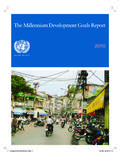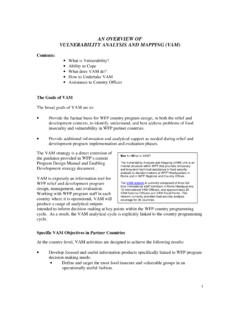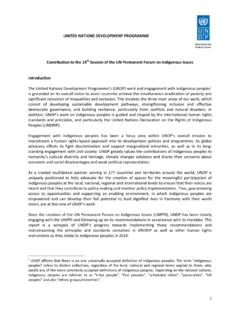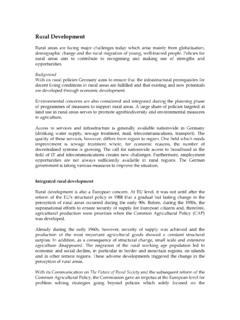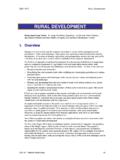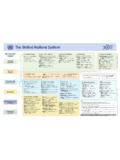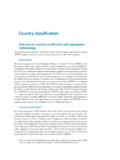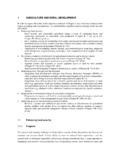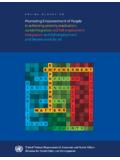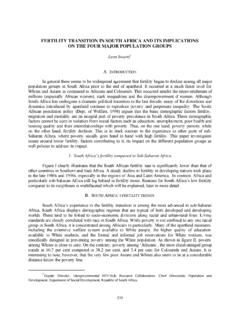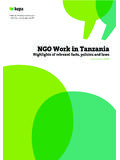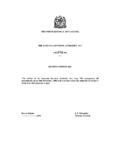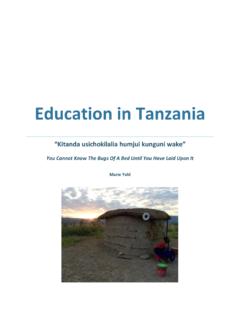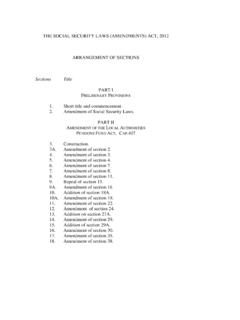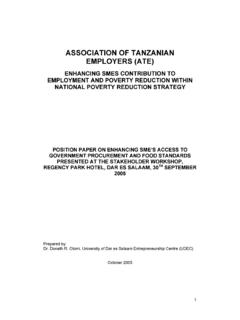Transcription of THE ROLE CO-OPERATIVES PLAY IN POVERTY …
1 THE ROLE CO-OPERATIVES play IN POVERTY reduction IN tanzania Mwelukilwa Joshua Sizya Director of Research and Consultancy Cooperative College, Moshi, tanzania Paper Presented at the United Nations in observance of the International Day for the Eradication of POVERTY on 17 October 2001 1 ABBREVIATIONS ADB African Development Bank AMCOS Agricultural Marketing Co- operative Societies CC Co- operative College CSA Co- operative Societies Act GDP Gross Domestic Product IFAD International Fund for Agricultural Development IMF International Monetary Fund KCB Kilimanjaro
2 Co- operative Bank KCU Kagera Co- operative Union KDCU Karagwe District Co- operative Union KNCU Kilimanjaro Native Co- operative Union RFSCB Rural Financial Services Community Based SACCOS Savings and Credit Co- operative Societies SCCULT Savings and Credit Co- operative Union League of tanzania SHERFS Southern Highlands Economic and Rural Financial Services TFC tanzania Federation of CO-OPERATIVES TICU tanzania Industrial Co- operative Union UCU Usambara Co- operative Union WB World Bank WETCU Western Tobacco Growers Co- operative Union 2 ACKNOWLEDGEMENTS I wish to record my sincere gratitude to the United Nations Division for Social Policy and Development for inviting me to participate in the panel discussion on the role of cooperatives in POVERTY reduction in observance of the International Day for the Eradication of POVERTY for 2001.
3 I feel very much honoured to have been availed such an opportunity at this stage of my long career with cooperatives in tanzania and the Eastern and Southern African Sub Region. The opportunity has given me the chance to share my ideas and gain deeper insight on the efficacy of cooperatives in addressing the development problems of particularly the less advantaged sections of communities in Africa and else where. I wish in particular to thank Mr. James Kanu who has been instrumental in initially contacting me and maintaining communications, which eventually lead to my being invited to the panel.
4 Mr. Geoffrey Ngomuo and Dr. FM Shao facilitated communications, which were sometimes difficult. Mr. John Langmore tirelessly gave me details on the panel presentation without which I could not have presented this paper. Nimali S. Ariyawansa was active in keeping me posted with developments through difficult E-Mail communications. In concretising the paper in its current form I gained a lot from the inspiring intellectual discussions on cooperatives with Prof. Suleman Adam Chambo and other colleagues at the Cooperative College in Moshi, tanzania .
5 However, the contents of the paper are my own responsibility and should not in any way be taken to be representing the policies of the Tanzanian Government or anyone else. Mwelukilwa Joshua Sizya Cooperative College Moshi, October 2001 3 1. Background Why this paper This paper has been prepared as contribution to the panel discussion on the role of cooperatives in POVERTY reduction on the occasion of observing the International Day for the Eradication of POVERTY . The paper is based on my experience with cooperatives and cooperative development in tanzania .
6 As is typical of many postcolonial African countries, cooperatives have formed a major part of the development strategies aimed at the majority of rural communities. It is understood that cooperatives provide a model for pooling resources of people of limited means to achieve commonly identified development needs of the respective people. In the case of tanzania Cooperatives have constituted part of the core variables in the political philosophy and development policies which have guided the development of the country.
7 This has had very substantial impact on the growth and development of the cooperative movement with important implications on the potential contribution of cooperatives to POVERTY reduction . The paper attempts to give a synoptic overview of the role of cooperatives in the country s efforts to attack POVERTY . The paper does not give detailed analysis of the achievements of cooperatives, as this would require deeper research, which could not be attempted prior to the panel discussions.
8 Some tentative suggestions for the future development of cooperatives are made. tanzania Country Information tanzania is the second largest country after The Democratic Republic of Congo, in East and Central Africa. It covers an area of 945,000 square kilometers. Based on 1998 estimates the population was then million people, with annual growth of percent. Bank of tanzania estimates the population at million by December 1999 [9]. More than 120 ethnic groups comprise the population; 80 per cent of which lives in the rural areas dependent on small-scale farming.
9 The GDP estimate at market prices is US$ 8,376 million(1998), with growth rate of 5 per cent per annum. GDP per capita stands at US$ 279. Agriculture dominates the economy, accounting for 55 per cent of GDP and 80 per cent of recorded total foreign exchange earnings while providing employment for 70 per cent of the labour force. The inflation rate stands at per cent . Defining POVERTY Discussion about the role of cooperatives in POVERTY reduction should start with a brief discussion of POVERTY .
10 POVERTY is a complex concept which dose not fit into a neat definition. It entails a complex interconnection of descriptors surrounding the livelihood status of people in communities. According to the World Summit for Social Development held in Copenhagen in 1995 POVERTY has various manifestations including lack of income and productive resources sufficient to ensure sustainable livelihoods; hunger and malnutrition; ill health; limited or lack of access to education and other basic services; increased morbidity and mortality from illness; homelessness and inadequate housing; unsafe environments; and social discrimination and exclusion.
